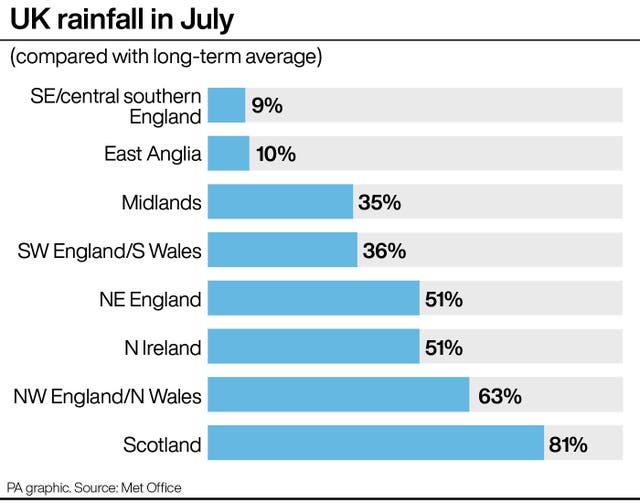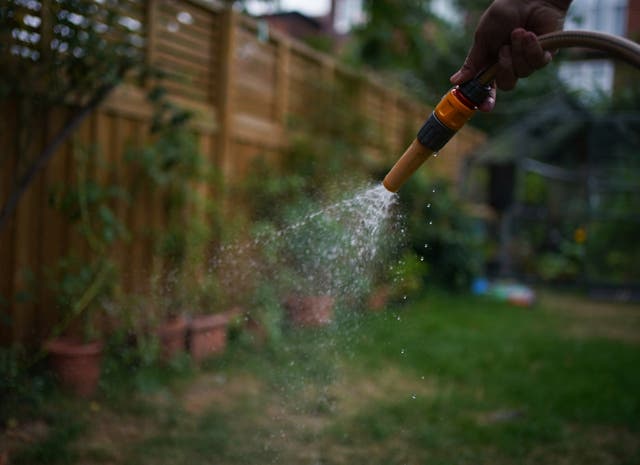Experts are warning of the need to manage water demand in a changing climate.
03 August 2022
Householders in parts of England are to see hosepipe bans come into force as months of dry conditions push the country towards drought.
After two water companies announced restrictions, others are warning they may need to follow suit if the sustained dry weather and high demand continues.
As utilities urge customers to use water wisely even without restrictions, for example by ditching the hosepipe for the garden and cleaning cars, there are warnings the UK must manage water demand for a changing climate.
South East Water became the second water company to restrict use of hosepipes and sprinklers, announcing a ban within Kent and Sussex from Friday August 12 until further notice.
This will mean hosepipes cannot be used to water gardens or clean cars, and ornamental ponds and swimming pools must not be filled.
Southern Water announced the first hosepipe ban of the year last week on Hampshire and the Isle of Wight from this Friday.
The moves to curb water use come after England has seen the driest eight-month period from November 2021 to July since 1976, when much of the country struggled in extreme drought.
Last month saw a record-breaking heatwave and the driest July in records dating back to 1836 for south east and central southern England.
For England as a whole last month was the driest since 1935, Met Office figures show.
The country could be in drought this month if the dry conditions continue, the Environment Agency has warned.
In a statement on its website, South East Water said: “During July in the South East, we have only seen 8% of average rainfall for the month, and the long-term forecast for August and September is for similar weather.
“The demand for water this summer has broken all previous records, including the Covid lockdown heatwave. We have been producing an additional 120 million litres of water a day to supply our customers, which is the equivalent of supplying a further four towns the size of Maidstone or Eastbourne, daily.”


The company said it had been left with “no choice” but to restrict the use of hosepipes and sprinklers.
“We are taking this step to ensure we have enough water for both essential use and to protect the environment.
“This will enable us to also reduce the amount of water we need to take from already stressed local water sources.”
In its latest update, South West Water said that “if the exceptional levels of demand and sustained dry weather continues we may have to make the difficult decision to introduce formal restrictions over the coming weeks to limit the pressure on resources and to protect the environment”.
The company said customers would be kept fully informed and urged people to avoid non-essential water use such as using a hosepipe for the garden and for washing cars.
In Wales, Welsh Water said water resources across the majority of the country were in a “reasonably good position” despite the dry period, but said it was concerned about Pembrokeshire, where average rainfall had been a lot lower than elsewhere.
“We are monitoring the situation very closely and communicating with customers there to urge them to use less water. The message is simple, use what you need but please don’t waste it,” the company said.
Some water companies say they are not anticipating having to bring in restrictions this year – but warned the autumn and winter would need to restock supplies.
Affinity Water, which supplies water to parts of south-east England and London, said that it should not need to introduce restrictions this year, but was dependent on rainfall over the coming winter to refill groundwater aquifers for next spring and summer.
An Anglian Water spokesperson said: “Despite a very dry year so far, our reservoir levels are stable, at around 80% full, and our groundwater sources are in reasonable shape too, so we’re not currently planning on any hosepipe bans this year,” but added river levels were being closely watched.
“Although one dry winter doesn’t give us cause for concern now, we also need to make sure we conserve enough water for tomorrow, next month and next summer too.
“Certainly if we have a second dry winter this year, we won’t be in the same position next spring,” the spokesperson said.
Yorkshire Water said the area had received some rain, which had slowed the rate at which water levels were falling in its reservoirs and enabled it to take some water from the area’s rivers.
Reservoirs in the region are 51% full, down 2% over the week, a spokesman said, adding that the message was still to ask customers to use water wisely.


Prof Kevin Hiscock, a hydrology and water resources expert from the University of East Anglia, said climate change meant summers were expected to become warmer for longer.
Measures ranging from companies’ continued investment in reducing water leaks, longer-term planning to increase reservoir capacity, campaigns to install water meters, planting woodland and restoring wetlands all have a part to play.
He said: “We can all make a difference by using water wisely during a drought, for example restricting our use of hosepipes for watering the garden or washing the car.
“In the longer term, then harvesting rainwater for outdoor use, installing water-efficient domestic appliances and, if not already installed, getting a water meter, all help to manage our individual water demand.”



